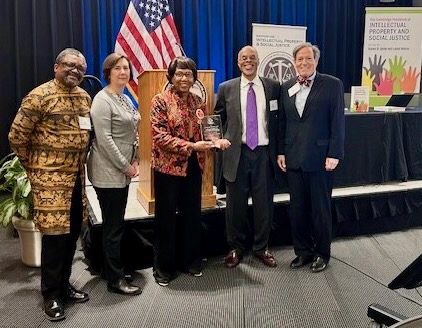A virtual museum initiative to activate creativity among underserved communities through libraries and prisons. For our work concerning creativity in prisons, please visit the Creative Prisons Project.
Celebrating board member Dr. Patricia Sluby's award for lifetime achievement by the Institute for Intellectual Property and Social Justice. See the announcement here.
We were delighted to prescreen the film Master of Light and host a discussion of the film with Isiah Daniels, creator of Mwasi Arts: https://mwasiarts.com/. In Isiah's own words,
"I had to be around eight years old when I realized that I was hated by the ones that were supposed to care for me and love me. My home was one of hate, violence, drugs, and abuse filled with monsters. My family was completely torn apart along with the relationships of siblings. (Some that still have never spoken again.) I hated my mother as much as she hated her mother. It wasn’t until her death that I became free. My heart raced because I knew… that all the Monsters are now gone! I now have found peace in the Arts. P.S I cried the day of my Mothers funeral." ––Isiah Daniels
The Prison Arts Project was Isiah's partner in the arts.
Click HERE to watch a discussion of the film that took place on 3 December 2022. Here is a good review of the film: https://www.theguardian.com/film/2022/nov/16/hbo-documentary-master-of-light. Film-maker Rosa Ruth Boesten is indeed a master herself.
Click HERE to watch the trailer.
Listen to "The Many Inventions of Beatrice Kenner," featuring MBIE Board Member Dr. Patricia Carter Sluby, here.
The Museum for Black Innovation and Entrepreneurship (MBIE) is a 501(c)(3) nonprofit organization that inspires and celebrates innovation and entrepreneurship within and around the Black experience and builds community capacity for innovation and entrepreneurship by increasing and disseminating the knowledge necessary to advance such endeavors.
The organization serves as a museum, a catalyst for education about intellectual property rights, and a community economic development organization. MBIE was incorporated in Washington, DC on 20 June 2011.
We are currently focusing on three initiatives that promote creativity as the root of innovation and entrepreneurship:
1. IPFI – Intellectual Property for Innovation: Everyone should be as aware of the Constitution's clause that protects your intellectual property as are aware of the Second Amendment right to bear arms. Especially in underrepresented communities, where creativity abounds, creators should know that they can protect ownership of their creative works. Their works should then be published through public libraries at no cost, protecting the creator's copyright, and presented to publishers or galleries for commercialization with revenues secured for the creator. IPFI aims to raise public awareness of copyright protection, engage libraries to publish anthologies of locally created works, and encourage commercial publishers seeking new talent to scout these anthologies and to contract directly with the talent in our communities. Imagine that the creative potential of the Constitution might be as appreciated as the right to own guns. Click here to download our IPFI Handbook.
2. MBIE for Librarians: There is a substantial and growing literature on Black innovation and entrepreneurship. This project encourages public libraries to arrange exhibits of their books and other materials on this subject with posters to raise awareness of Black innovators and entrepreneurs. Such an exhibit is a mini-MBIE. Each of the 19,000 public libraries in the country could offer such an exhibit. Imagine the inspiration this might have on library visitors of all ages. Click here to download our MBIE for Librarians Handbook.
3. IP in Prisons: The incarcerated population in the United States is sadly large enough to be the nation's fifth largest city. Yet the creative potential of these people is completely ignored, wasting the intention of the Constitution's intellectual property clause meant to provide an incentive for creativity among all those in America to advance the nation's well being and competitiveness. This project aims to raise awareness of IP protection among the prison population and provide ways for creators to produce literature, art, music, film, and other works for commercial distribution. Imagine tapping into the creativity potential of the nation's fifth largest city. Click here to view essays written by incarcerated people. Download this protocol to facilitate registering copyright from prison.
4. Creative Prisons Project: A series of initiatives aimed "to engage more people in prisons in producing creative works, to protect their intellectual property, and to facilitate ways to share their works with the public. The ultimate aim is to achieve a more perfect and inclusive Union by using creativity to humanize prisons and society and to promote the eradication of poverty and racism." (Source: Prisons of Creativity, by John R. Whitman, 2024) See also: Copyright Behind Bars At the Intersection of Systemic Incarceration and IP Social Justice This project is mobilizing resources to help develop:
- A book, Prisons of Creativity, to promote creativity in prisons.
- A protocol that will enable incarcerated people to register their copyrights with the U.S. Copyright Office.
- A national framework to engage diverse organizations and people to leverage their respective assets to increase arts-in-corrections teaching and to facilitate public dissemination of works created in prisons.
- A federal credit union to provide banking services to incarcerated and formerly incarcerated people.
For more information on the Creative Prisons Project please email whitman at mbiedc.org.
There may be few other stories as unique or compelling as the Black experience of creativity during centuries of virtually total disenfranchisement. The story of this history and experience, which includes both the Black community and the context in which it was and is situated, is the subject to be explored in this web site and in the Museum (see here for our statement, “What Is Black Innovation and Entrepreneurship?”.
Find out more about the Museum for Black Innovation and Entrepreneurship at Guidestar.

